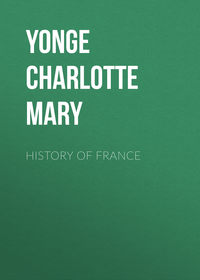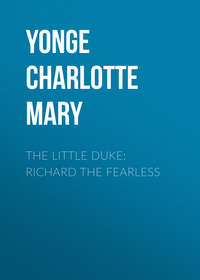
A Book of Golden Deeds
Copeland, falling on one knee, replied, 'If God, out of His great kindness, has given me the King of Scotland, no one ought to be jealous of it, for God can, when He pleases, send His grace to a poor squire as well as to a great Lord. Sir, do not take it amiss if I did not surrender him to the orders of my lady the Queen, for I hold my lands of you, and my oath is to you, not to her.'
The King was not displeased with his squire's sturdiness, but made him a knight, gave him a pension of 500l. a year, and desired him to surrender his prisoner to the Queen, as his own representative. This was accordingly done, and King David was lodged in the Tower of London. Soon after, three days before All Saint's Day, there was a large and gay fleet to be seen crossing from the white cliffs of Dover, and the King, his son, and his knights rode down to the landing place to welcome plump, fair haired Queen Philippa, and all her train of ladies, who had come in great numbers to visit their husbands, fathers, or brothers in the wooden town.
Then there was a great Court, and numerous feasts and dances, and the knights and squires were constantly striving who could do the bravest deed of prowess to please the ladies. The King of France had placed numerous knights and men-at-arms in the neighboring towns and castles, and there were constant fights whenever the English went out foraging, and many bold deeds that were much admired were done. The great point was to keep provisions out of the town, and there was much fighting between the French who tried to bring in supplies, and the English who intercepted them. Very little was brought in by land, and Sir Jean de Vienne and his garrison would have been quite starved but for two sailors of Abbeville, named Marant and Mestriel, who knew the coast thoroughly, and often, in the dark autumn evenings, would guide in a whole fleet of little boats, loaded with bread and meat for the starving men within the city. They were often chased by King Edward's vessels, and were sometimes very nearly taken, but they always managed to escape, and thus they still enabled the garrison to hold out.
So all the winter passed, Christmas was kept with brilliant feastings and high merriment by the King and his Queen in their wooden palace outside, and with lean cheeks and scanty fare by the besieged within. Lent was strictly observed perforce by the besieged, and Easter brought a betrothal in the English camp; a very unwilling one on the part of the bridegroom, the young Count of Flanders, who loved the French much better than the English, and had only been tormented into giving his consent by his unruly vassals because they depended on the wool of English sheep for their cloth works. So, though King Edward's daughter Isabel was a beautiful fair-haired girl of fifteen, the young Count would scarcely look at her; and in the last week before the marriage day, while her robes and her jewels were being prepared, and her father and mother were arranging the presents they should make to all their Court on the wedding day, the bridegroom, when out hawking, gave his attendants the slip, and galloped off to Paris, where he was welcomed by King Philippe.
This made Edward very wrathful, and more than ever determined to take Calais. About Whitsuntide he completed a great wooden castle upon the seashore, and placed in it numerous warlike engines, with forty men-at- arms and 200 archers, who kept such a watch upon the harbour that not even the two Abbeville sailors could enter it, without having their boats crushed and sunk by the great stones that the mangonels launched upon them. The townspeople began to feel what hunger really was, but their spirits were kept up by the hope that their King was at last collecting an army for their rescue.
And Philippe did collect all his forces, a great and noble army, and came one night to the hill of Sangate, just behind the English army, the knights' armor glancing and their pennons flying in the moonlight, so as to be a beautiful sight to the hungry garrison who could see the white tents pitched upon the hillside. Still there were but two roads by which the French could reach their friends in the town—one along the seacoast, the other by a marshy road higher up the country, and there was but one bridge by which the river could be crossed. The English King's fleet could prevent any troops from passing along the coast road, the Earl of Derby guarded the bridge, and there was a great tower, strongly fortified, close upon Calais. There were a few skirmishes, but the French King, finding it difficult to force his way to relieve the town, sent a party of knights with a challenge to King Edward to come out of his camp and do battle upon a fair field.
To this Edward made answer, that he had been nearly a year before Calais, and had spent large sums of money on the siege, and that he had nearly become master of the place, so that he had no intention of coming out only to gratify his adversary, who must try some other road if he could not make his way in by that before him.
Three days were spent in parleys, and then, without the slightest effort to rescue the brave, patient men within the town, away went King Philippe of France, with all his men, and the garrison saw the host that had crowded the hill of Sangate melt away like a summer cloud.
August had come again, and they had suffered privation for a whole year for the sake of the King who deserted them at their utmost need. They were in so grievous a state of hunger and distress that the hardiest could endure no more, for ever since Whitsuntide no fresh provisions had reached them. The Governor, therefore, went to the battlements and made signs that he wished to hold a parley, and the King appointed Lord Basset and Sir Walter Mauny to meet him, and appoint the terms of surrender.
The Governor owned that the garrison was reduced to the greatest extremity of distress, and requested that the King would be contented with obtaining the city and fortress, leaving the soldiers and inhabitants to depart in peace.
But Sir Walter Mauny was forced to make answer that the King, his lord, was so much enraged at the delay and expense that Calais had cost him, that he would only consent to receive the whole on unconditional terms, leaving him free to slay, or to ransom, or make prisoners whomsoever he pleased, and he was known to consider that there was a heavy reckoning to pay, both for the trouble the siege had cost him and the damage the Calesians had previously done to his ships.
The brave answer was: 'These conditions are too hard for us. We are but a small number of knights and squires, who have loyally served our lord and master as you would have done, and have suffered much ill and disquiet, but we will endure far more than any man has done in such a post, before we consent that the smallest boy in the town shall fare worse than ourselves. I therefore entreat you, for pity's sake, to return to the King and beg him to have compassion, for I have such an opinion of his gallantry that I think he will alter his mind.'
The King's mind seemed, however, sternly made up; and all that Sir Walter Mauny and the barons of the council could obtain from him was that he would pardon the garrison and townsmen on condition that six of the chief citizens should present themselves to him, coming forth with bare feet and heads, with halters round their necks, carrying the keys of the town, and becoming absolutely his own to punish for their obstinacy as he should think fit.
On hearing this reply, Sir Jean de Vienne begged Sir Walter Mauny to wait till he could consult the citizens, and, repairing to the marketplace, he caused a great bell to be rung, at sound of which all the inhabitants came together in the town hall. When he told them of these hard terms he could not refrain from weeping bitterly, and wailing and lamentation arose all round him. Should all starve together, or sacrifice their best and most honored after all suffering in common so long?
Then a voice was heard; it was that of the richest burgher in the town, Eustache de St. Pierre. 'Messieurs high and low,' he said, 'it would be a sad pity to suffer so many people to die through hunger, if it could be prevented; and to hinder it would be meritorious in the eyes of our Saviour. I have such faith and trust in finding grace before God, if I die to save my townsmen, that I name myself as the first of the six.'
As the burgher ceased, his fellow townsmen wept aloud, and many, amid tears and groans, threw themselves at his feet in a transport of grief and gratitude. Another citizen, very rich and respected, rose up and said, 'I will be second to my comrade, Eustache.' His name was Jean Daire. After him, Jacques Wissant, another very rich man, offered himself as companion to these, who were both his cousins; and his brother Pierre would not be left behind: and two more, unnamed, made up this gallant band of men willing to offer their lives for the rescue of their fellow townsmen.
Sir Jean de Vienne mounted a little horse—for he had been wounded, and was still lame—and came to the gate with them, followed by all the people of the town, weeping and wailing, yet, for their own sakes and their children's not daring to prevent the sacrifice. The gates were opened, the governor and the six passed out, and the gates were again shut behind them. Sir Jean then rode up to Sir Walter Mauny, and told him how these burghers had voluntarily offered themselves, begging him to do all in his power to save them; and Sir Walter promised with his whole heart to plead their cause. De Vienne then went back into the town, full of heaviness and anxiety; and the six citizens were led by Sir Walter to the presence of the King, in his full Court. They all knelt down, and the foremost said: 'Most gallant King, you see before you six burghers of Calais, who have all been capital merchants, and who bring you the keys of the castle and town. We yield ourselves to your absolute will and pleasure, in order to save the remainder of the inhabitants of Calais, who have suffered much distress and misery. Condescend, therefore, out of your nobleness of mind, to have pity on us.'
Strong emotion was excited among all the barons and knights who stood round, as they saw the resigned countenances, pale and thin with patiently endured hunger, of these venerable men, offering themselves in the cause of their fellow townsmen. Many tears of pity were shed; but the King still showed himself implacable, and commanded that they should be led away, and their heads stricken off. Sir Walter Mauny interceded for them with all his might, even telling the King that such an execution would tarnish his honor, and that reprisals would be made on his own garrisons; and all the nobles joined in entreating pardon for the citizens, but still without effect; and the headsman had been actually sent for, when Queen Philippa, her eyes streaming with tears, threw herself on her knees amongst the captives, and said, 'Ah, gentle sir, since I have crossed the sea, with much danger, to see you, I have never asked you one favor; now I beg as a boon to myself, for the sake of the Son of the Blessed Mary, and for your love to me, that you will be merciful to these men!'
For some time the King looked at her in silence; then he exclaimed: 'Dame, dame, would that you had been anywhere than here! You have entreated in such a manner that I cannot refuse you; I therefore give these men to you, to do as you please with.'
Joyfully did Queen Philippa conduct the six citizens to her own apartments, where she made them welcome, sent them new garments, entertained them with a plentiful dinner, and dismissed them each with a gift of six nobles. After this, Sir Walter Mauny entered the city, and took possession of it; retaining Sir Jean de Vienne and the other knights and squires till they should ransom themselves, and sending out the old French inhabitants; for the King was resolved to people the city entirely of English, in order to gain a thoroughly strong hold of this first step in France.
The King and Queen took up their abode in the city; and the houses of Jean Daire were, it appears, granted to the Queen—perhaps, because she considered the man himself as her charge, and wished to secure them for him—and her little daughter Margaret was, shortly after, born in one of his houses. Eustache de St. Pierre was taken into high favor, and placed in charge of the new citizens whom the King placed in the city.
Indeed, as this story is told by no chronicler but Froissart, some have doubted of it, and thought the violent resentment thus imputed to Edward III inconsistent with his general character; but it is evident that the men of Calais had given him strong provocation by attacks on his shipping—piracies which are not easily forgiven—and that he considered that he had a right to make an example of them. It is not unlikely that he might, after all, have intended to forgive them, and have given the Queen the grace of obtaining their pardon, so as to excuse himself from the fulfillment of some over-hasty threat. But, however this may have been, nothing can lessen the glory of the six grave and patient men who went forth, by their own free will, to meet what might be a cruel and disgraceful death, in order to obtain the safety of their fellow- townsmen.
Very recently, in the summer of 1864, an instance has occurred of self- devotion worthy to be recorded with that of Eustache de St. Pierre. The City of Palmyra, in Tennessee, one of the Southern States of America, had been occupied by a Federal army. An officer of this army was assassinated, and, on the cruel and mistaken system of taking reprisals, the general arrested ten of the principal inhabitants, and condemned them to be shot, as deeming the city responsible for the lives of his officers. One of them was the highly respected father of a large family, and could ill be spared. A young man, not related to him, upon this, came forward and insisted on being taken in his stead, as a less valuable life. And great as was the distress of his friend, this generous substitution was carried out, and not only spared a father to his children, but showed how the sharpest strokes of barbarity can still elicit light from the dark stone—light that but for these blows might have slept unseen.
THE BATTLE OF SEMPACH
1397
Nothing in history has been more remarkable than the union of the cantons and cities of the little republic of Switzerland. Of differing races, languages, and, latterly, even religions—unlike in habits, tastes, opinions and costumes—they have, however, been held together, as it were, by pressure from without, and one spirit of patriotism has kept the little mountain republic complete for five hundred years.
Originally the lands were fiefs of the Holy Roman Empire, the city municipalities owning the Emperor for their lord, and the great family of Hapsburg, in whom the Empire became at length hereditary, was in reality Swiss, the county that gave them title lying in the canton of Aargau. Rodolf of Hapsburg was elected leader of the burghers of Zurich, long before he was chosen to the Empire; and he continued a Swiss in heart, retaining his mountaineer's open simplicity and honesty to the end of his life. Privileges were granted by him to the cities and the nobles, and the country was loyal and prosperous in his reign.
His son Albert, the same who was slain by his nephew Johann, as before- mentioned, permitted those tyrannies of his bailiffs which goaded the Swiss to their celebrated revolt, and commenced the long series of wars with the House of Hapsburgor, as it was now termed, of Austria—which finally established their independence.
On the one side, the Dukes of Austria and their ponderous German chivalry wanted to reduce the cantons and cities to vassalage, not to the Imperial Crown, a distant and scarcely felt obligation, but to the Duchy of Austria; on the other, the hardy mountain peasants and stout burghers well knew their true position, and were aware that to admit the Austrian usurpation would expose their young men to be drawn upon for the Duke's wars, cause their property to be subject to perpetual rapacious exactions, and fill their hills with castles for ducal bailiffs, who would be little better than licensed robbers. No wonder, then, that the generations of William Tell and Arnold Melchthal bequeathed a resolute purpose of resistance to their descendants.
It was in 1397, ninety years since the first assertion of Swiss independence, when Leopold the Handsome, Duke of Austria, a bold but misproud and violent prince, involved himself in one of the constant quarrels with the Swiss that were always arising on account of the insulting exactions of toll and tribute in the Austrian border cities. A sharp war broke out, and the Swiss city of Lucerne took the opportunity of destroying the Austrian castle of Rothemburg, where the tolls had been particularly vexatious, and of admitting to their league the cities of Sempach and Richensee.
Leopold and all the neighboring nobles united their forces. Hatred and contempt of the Swiss, as low-born and presumptuous, spurred them on; and twenty messengers reached the Duke in one day, with promises of support, in his march against Sempach and Lucerne. He had sent a large force in the direction of Zurich with Johann Bonstetten, and advanced himself with 4,000 horse and 1,400 foot upon Sempach. Zurich undertook its own defense, and the Forest cantons sent their brave peasants to the support of Lucerne and Sempach, but only to the number of 1,300, who, on the 9th of July, took post in the woods around the little lake of Sempach.
Meanwhile, Leopold's troops rode round the walls of the little city, insulting the inhabitants, one holding up a halter, which he said was for the chief magistrate; and another, pointing to the reckless waste that his comrades were perpetrating on the fields, shouted, 'Send a breakfast to the reapers.' The burgomaster pointed to the wood where his allies lay hid, and answered, 'My masters of Lucerne and their friends will bring it.'
The story of that day was told by one of the burghers who fought in the ranks of Lucerne, a shoemaker, named Albert Tchudi, who was both a brave warrior and a master-singer; and as his ballad was translated by another master-singer, Sir Walter Scott, and is the spirited record of an eyewitness, we will quote from him some of his descriptions of the battle and its golden deed.
The Duke's wiser friends proposed to wait till he could be joined by Bonstetten and the troops who had gone towards Zurich, and the Baron von Hasenburg (i.e. hare-rock) strongly urged this prudent counsel; but—
'O, Hare-Castle, thou heart of hare!' Fierce Oxenstiern he cried, 'Shalt see then how the game will fare,' The taunted knight replied.''This very noon,' said the younger knight to the Duke, 'we will deliver up to you this handful of villains.'
'And thus they to each other said, 'Yon handful down to hew Will be no boastful tale to tell The peasants are so few.'Characteristically enough, the doughty cobbler describes how the first execution that took place was the lopping off the long-peaked toes of the boots that the gentlemen wore chained to their knees, and which would have impeded them on foot; since it had been decided that the horses were too much tired to be serviceable in the action.
'There was lacing then of helmets bright, And closing ranks amain, The peaks they hewed from their boot points Might well nigh load a wain.'They were drawn up in a solid compact body, presenting an unbroken line of spears, projecting beyond the wall of gay shields and polished impenetrable armor.
The Swiss were not only few in number, but armor was scarce among them; some had only boards fastened on their arms by way of shields, some had halberts, which had been used by their fathers at the battle of Morgarten, others two-handed swords and battleaxes. They drew themselves up in the form of a wedge and
'The gallant Swiss confederates then They prayed to God aloud, And He displayed His rainbow fair, Against a swarthy cloud.'Then they rushed upon the serried spears, but in vain. 'The game was nothing sweet.'
The banner of Lucerne was in the utmost danger, the Landamman was slain, and sixty of his men, and not an Austrian had been wounded. The flanks of the Austrian host began to advance so as to enclose the small peasant force, and involve it in irremediable destruction. A moment of dismay and stillness ensued. Then Arnold von Winkelried of Unterwalden, with an eagle glance saw the only means of saving his country, and, with the decision of a man who dares by dying to do all things, shouted aloud: 'I will open a passage.'
'I have a virtuous wife at home, A wife and infant son: I leave them to my country's care, The field shall yet be won!' He rushed against the Austrian band In desperate career, And with his body, breast, and hand, Bore down each hostile spear; Four lances splintered on his crest, Six shivered in his side, Still on the serried files he pressed, He broke their ranks and died!'The very weight of the desperate charge of this self-devoted man opened a breach in the line of spears. In rushed the Swiss wedge, and the weight of the nobles' armor and length of their spears was only encumbering. They began to fall before the Swiss blows, and Duke Leopold was urged to fly. 'I had rather die honorably than live with dishonor,' he said. He saw his standard bearer struck to the ground, and seizing his banner from his hand, waved it over his head, and threw himself among the thickest of the foe. His corpse was found amid a heap of slain, and no less then 2000 of his companions perished with him, of whom a third are said to have been counts, barons and knights.
'Then lost was banner, spear and shield At Sempach in the flight; The cloister vaults at Konigsfeldt Hold many an Austrian knight.'The Swiss only lost 200; but, as they were spent with the excessive heat of the July sun, they did not pursue their enemies. They gave thanks on the battlefield to the God of victories, and the next day buried the dead, carrying Duke Leopold and twenty-seven of his most illustrious companions to the Abbey of Konigsfeldt, where they buried him in the old tomb of his forefathers, the lords of Aargau, who had been laid there in the good old times, before the house of Hapsburg had grown arrogant with success.
As to the master-singer, he tells us of himself that
'A merry man was he, I wot, The night he made the lay, Returning from the bloody spot, Where God had judged the day.'On every 9th of July subsequently, the people of the country have been wont to assemble on the battlefield, around four stone crosses which mark the spot. A priest from a pulpit in the open air gives a thanksgiving sermon on the victory that ensured the freedom of Switzerland, and another reads the narrative of the battle, and the roll of the brave 200, who, after Winkelried's example, gave their lives in the cause. All this is in the face of the mountains and the lake now lying in summer stillness, and the harvest fields whose crops are secure from marauders, and the congregation then proceed to the small chapel, the walls of which are painted with the deed of Arnold von Winkelried, and the other distinguished achievements of the confederates, and masses are sung for the souls of those who were slain. No wonder that men thus nurtured in the memory of such actions were, even to the fall of the French monarchy, among the most trustworthy soldiery of Europe.
THE CONSTANT PRINCE
1433
The illustrious days of Portugal were during the century and a half of the dynasty termed the House of Aviz, because its founder, Dom Joao I. had been grand master of the military order of Aviz.
His right to the throne was questionable, or more truly null, and he had only obtained the crown from the desire of the nation to be independent of Castile, and by the assistance of our own John of Gaunt, whose daughter, Philippa of Lancaster, became his wife, thus connecting the glories of his line with our own house of Plantagenet.
Philippa was greatly beloved in Portugal, and was a most noble-minded woman, who infused her own spirit into her children. She had five sons, and when they all had attained an age to be admitted to the order of knighthood, their father proposed to give a grand tournament in which they might evince their prowess. This, however, seemed but play to the high-spirited youths, who had no doubt fed upon the story of the manner in which their uncle, the Black Prince, whose name was borne by the eldest, had won his spurs at Crecy. Their entreaty was, not to be carpet—knights dubbed in time of peace, and King Joao on the other hand objected to entering on a war merely for the sake of knighting his sons. At last Dom Fernando, the youngest of the brothers, a lad of fourteen, proposed that their knighthood should be earned by an expedition to take Ceuta from the Moors. A war with the infidel never came amiss, and was in fact regarded as a sacred duty; moreover, Ceuta was a nest of corsairs who infested the whole Mediterranean coast. Up to the nineteenth century the seaports along the African coast of the Mediterranean were the hives of pirates, whose small rapid vessels were the terror of every unarmed ship that sailed in those waters, and whose descents upon the coasts of Spain, France, and Italy rendered life and property constantly insecure. A regular system of kidnapping prevailed; prisoners had their fixed price, and were carried off to labour in the African dockyards, or to be chained to the benches of the Moorish ships which their oars propelled, until either a ransom could be procured from their friends, or they could be persuaded to become renegades, or death put an end to their sufferings. A captivity among the Moors was by no means an uncommon circumstance even in the lives of Englishmen down to the eighteenth century, and pious persons frequently bequeathed sums of money for the ransom of the poorer captives.









